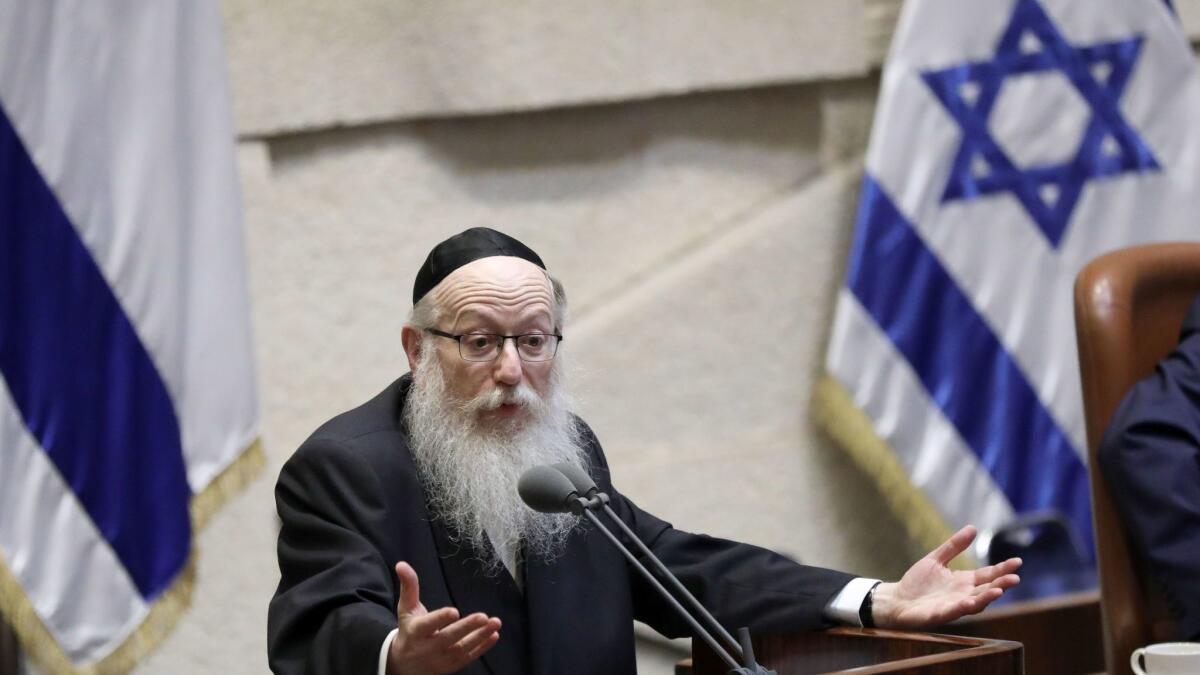In chaotic scenario, Israel heads for new elections; vote would be second this year

- Share via
JERUSALEM — Israel slid into political chaos Wednesday when scandal-ridden Prime Minister Benjamin Netanyahu failed in his efforts to form a new coalition government — and moved to make sure his main rival wouldn’t get to try to do so in his stead.
That means that only seven weeks after the last Israeli election, a new one is now on the horizon.
The developments not only cast a cloud over the political future of Netanyahu — a Houdini-like figure who in the past has been able to wriggle his way out of almost any political tight spot — but also darkens already dim prospects for a Mideast peace deal, which President Trump’s son-in-law, Jared Kushner, has been tasked with crafting.
The bizarre second-election scenario, the first of its kind in the country, was set in motion when Israel’s Knesset, or parliament, held a late-night vote to dissolve itself, with the prime minister having failed to form a governing coalition in the allotted time.
To do that, he would have needed to cobble together a majority in the 120-seat chamber. Once Israeli President Reuven Rivlin gave him a mandate to form a government, Netanyahu had 50 days to do so, with a deadline of midnight Wednesday.
If that deadline had passed, Rivlin would have given another lawmaker, almost certainly Netanyahu’s main electoral rival, former military chief Benny Gantz, a chance to put together a coalition.
The self-dissolution of parliament was the first step toward holding a new nationwide vote, now set for Sept. 17.
The political debacle began with the previous vote: an April 9 election that at first looked like another of Netanyahu’s trademark narrow escapes.
In that vote, his Likud Party won 36 parliamentary seats, barely squeaking past the second-place Blue and White party, which garnered 35 seats. Neither was nearly enough for a majority.
But Netanyahu’s allies on Israel’s political right also won significant numbers of seats, so he appeared to have enough support to form a coalition government and keep his job as prime minister. That proved a massive miscalculation.
The prime minister was unable to get the 61 seats he needed, and now the April vote will become the first in the country’s history not to produce a government.
In the meantime, Netanyahu — who has been prime minister for a decade and dominated the Israeli political scene for nearly a generation — will remain in his post, presiding over an interim government as Israelis confront a long summer of electioneering.
A hoarse and bleary-eyed Netanyahu was quick to cast blame elsewhere over what many fear will be a divisive and expensive election do-over.
“I didn’t spare any effort to avoid unnecessary elections,” he told reporters in an angry post-vote, post-midnight news conference.
Gantz, the Blue and White leader, said Netanyahu had acted for his own self-preservation rather than the good of the country, calling the prime minister “legally incapacitated” by the impending charges.
In failing to secure coalition commitments, Netanyahu was hampered by growing public doubts as he reversed an oft-repeated campaign promise not to seek personal legal immunity on corruption charges.
The prime minister stands accused of improperly accepting expensive gifts, ordering government action aimed at hurting one newspaper in exchange for favorable coverage from another, and helping a telecommunications company get regulatory concessions. He has denied any wrongdoing and denounced investigations as a witch hunt.
With charges looming, he appears set to become the first Israeli prime minister to be indicted while in office — even as he remains on track in July to surpass David Ben Gurion, Israel’s founding father, as the country’s longest-serving prime minister.
As the deadline to form a government approached, Netanyahu sought to put together a narrow, extreme right-wing coalition that stretched the boundaries of Likud, traditionally a center-right party.
Considered by many critics to be a classic political opportunist, Netanyahu was undone by a onetime ally, Avigdor Lieberman, a former aide who leads a small parliamentary faction, Yisrael Beitenu. It has only five Knesset seats, but the prime minister needed them to clinch a majority.
He and Netanyahu could not come to terms over Lieberman’s demand to subject ultra-Orthodox religious men to the military draft, which is compulsory for most other citizens.
Since no one in the opposition wanted to go along with Netanyahu’s self-immunity plan, Lieberman’s refusal to back him doomed his efforts.
The upheaval boded ill for the Trump administration’s much-heralded peace effort. Kushner, a senior White House aide, arrived in Israel only hours before the Knesset dissolved itself, accompanied by special envoy Jason Greenblatt.
Though Israel’s conflict with the Palestinians is seen by most of the outside world as the defining challenge confronting the nation, domestic politics tend to revolve around a different set of concerns. One important example is the draft bill to conscript ultra-Orthodox Jews into the military, over which Netanyahu and Lieberman clashed.
Ultra-Orthodox Jews have had their military service exemption since the early days of statehood. But ultra-Orthodox Jews now account for about 10% of the population, and many Israelis feel that their traditionally large and often poor families are a heavy social burden.
Meanwhile, Netanyahu’s wife, Sara, made a plea deal with prosecutors who accused her of using public funds to pay private chefs to feed the first family while state-funded chefs were on standby.
As part of the deal, she pleaded guilty to a criminal offense and agreed to reimburse about $15,000 of the $100,000 she was accused of fraudulently charging the state.
“In 70 years of Israeli parliamentary democracy we have not had a situation such as this,” Einat Wilf, a former member of the Knesset for the Labor Party, said in an interview with the online publication Jewish Insider.
“In the Israeli system, the prime minister is not the person who has the most votes, but the person who has the most friends — and this time around, Netanyahu did not have enough parties which were willing to come together and overcome their differences to forge a coalition supporting his prime ministership.”
Special correspondent Tarnopolsky reported from Jerusalem and Times staff writer King from Washington.
More to Read
Sign up for Essential California
The most important California stories and recommendations in your inbox every morning.
You may occasionally receive promotional content from the Los Angeles Times.










